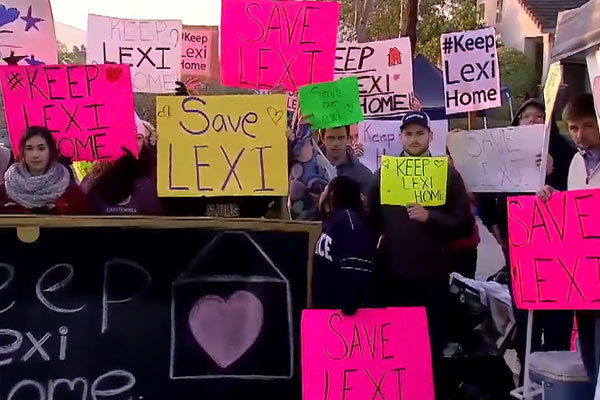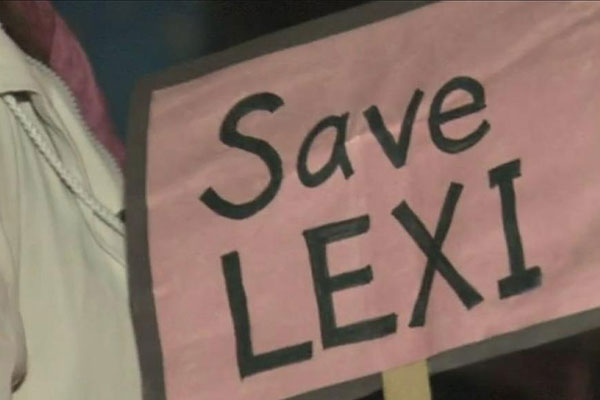QUICK FACTS
- The Page Family have been fighting to provide a permanent, safe, loving home for Lexi since 2012.
- They have won at the higher court level (Court of Appeals) twice.
- Each higher court ruling is sent back down (i.e. remanded) to the lower court. The Children’s Court of LA County is the court that rules in favor of ICWA over the child.
- As Lexi was being ripped away from her family, the Pages’ legal team filed with the California Supreme Court for emergency relief and for the state’s highest court to hear the case.
- If the Court of Appeals & California Supreme Court does not rule in favor of Lexi, the Page family will appeal to the U.S. Supreme Court to address the federal issues engrossing this case.
- The Pages have fostered before–but despite accusations, had a good relationship with the biological father & had no intention of adopting. They helped to reunify with a biological grandmother & continue to maintain contact with the biological father, grandmother & children.
- Summer Page has Native American heritage formally traced & accepted by her tribe, the Southern Band Tuscarora Indians. A formal letter was sent to DCFS that never made its way to the tribe.
CASE RECORDS
- Lexi was removed from her birth mother’s custody at 17 months, she has at least 6 other maternal siblings in LA County. (Page 1 – Court of Appeals decision)
- Lexi’s birth-mother has a lengthy substance abuse problem & her birth-father has an extensive criminal history. There was clear & convincing evidence that continued placement with the birth-father would likely cause Lexi serious emotional or physical damage. (Page 1 & Page 9 footnote)
- The tribe agreed to Lexi’s placement with the Page family while her birth-father reunified, there was no concurrent plan. (Page 1)
- It was not until after reunification services terminated that DCFS recommended placement with the family in Utah, a non-native, non-blood related family. (Page 2)
- The first trial court was wrong with how it determined good cause for deviating from ICWA’s placement preferences. It also erred when it failed to consider Lexi’s best interests, instead preferring ICWA. Good cause should have been determined based on “significant risk that a child will suffer serious harm as a result of a change in placement.” (Page 2, 34 & 36)
- The Court of Appeals determined that, had the correct standard been applied “it is reasonably probable that the court’s decision would have been different had it applied the correct good cause standard….considering Lexi’s best interests, including the strength & longevity of her bond to the Pages and the trauma she may suffer if that bond is broken.” (Page 39-40)
- The Court of Appeals stated that the passage of time could strengthen Lexi’s bond with the Pages even more. (Page 40)
- Lexi’s birth-father “initially denied any Indian heritage, and the record does not contain any evidence he ever lived on a reservation or had any social, political, or cultural ties to the tribe.” (Page 4 footnote)
- Lexi’s first months at the Page’s house were very difficult, showing substantial attachment issues. The Page’s addressed these issues through consistency and loving care, treating her as their own daughter. Through this healing, Lexi formed a strong primary bond and attachment with the entire family, viewing them as Mommy, Daddy and siblings. All parties agreed, the court agreeing that she is “extremely bonded.” (Pages 5, 8, 11 & 13)
- In mid-2012, the Department was confident there would be reunification with the birth-father, however soon thereafter his emotional state deteriorated when he separated from his wife. By September 2012, he declined further reunification services. (Page 6)
- Lexi’s family in Utah is related as step second cousins. (Ginger’s uncle is Lexi’s paternal step-grandfather) (Page 7)
- The tribe did not want the family in Utah to meet Lexi unless the birth father’s reunification services terminated—something that took over a year (Page 7)
- Lexi reported that she did not want to visit the family in Utah and did not like it when they visited. (Page 7)
- At the time of the first appeal, Lexi had already lived with the P’s for 2.5 years. (Page 8)
- It was not until after reunification services that the Page’s began to pursue adoption, that was when the DCFS social worker first brought up the family in Utah. The department did not officially request expedited placement until November 2012, one year after Lexi was placed with the Pages & thoroughly bonded/attached.(Page 8)
- January, 2013 Lexi’s attorney opposed Lexi’s move to Utah, issuing a “Do Not Remove” order to prevent Lexi from being moved. The Page’s did not even have a say in court at that time. (Page 10)
- The Pages were granted De Facto status in 2013, giving them a voice in the court. Lexi’s attorney, for no reason given, removed her opposition to Lexi’s move to Utah. (Page 10)
- All parties agreed that a transition would pose a risk of trauma, including depression & anxiety (that was 3 years ago). Everyone except DCFS’ social worker, Roberta Javier, who felt there would be no trauma breaking Lexi’s primary bond & attachment. (Page 11)
- Under ICWA, “foster care placements must be made within reasonable proximity to the child’s home” (1915(a)). Additionally, Welfare & Institution codes require a foster child be placed with siblings when possible. Yet Lexi’s youngest biological half-sister was moved directly to Utah, apparently without reunification services for the biological parents; unclear how placement is consistent with ICWA; status of placement (temporary vs pre-adoptive) unclear; DCFS has provided no information regarding the situation. (Page 27)
- This fact makes it hard to understand the Choctaw’s recent statement: ICWA “requires Lexi be given the chance to grow up with her family, with her sisters.” What was their motivation 2-3 years ago when Lexi’s paternal siblings were NOT with the family in Utah, but instead in LA County?
- ICWA’s “Good Cause Exception” was specifically written by Congress to allow courts to place Indian children outside of the ICWA’s placement preferences. (Page 28)
- The second trial decision had a gross legal error because it applied the wrong standard again that was “identical, word-for-word, to the language we disapproved as an incorrect statement of law in the prior appeal.” (Second Appeal, Page 2). This gross legal error led to a substantial delay in the case & once again showed the bias for ICWA in the children’s court.
- The second appeal demanded the trial court to come to a decision with 30 days, absent extraordinary circumstances, but did not anticipate the changing of a judge, which led to a hasty decision in the third trial.
BONDING & ATTACHMENT
Dr. Karyn Purvis and the Institute of Child Development discuss why attachment is a critical issue for young children.


